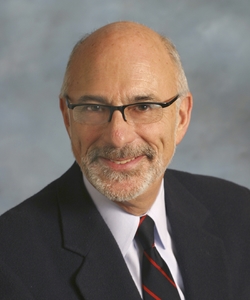JAMS Pathways Profile: Focus on Jay Folberg

How does your background lend itself to doing JAMS Pathways work?
From my decades-long experience as a trial lawyer, professor teaching dispute resolution, law school dean, and board member of several nonprofits, I know firsthand how time, energy and resources can be zapped by internal conflicts. My focus now as a mediator and facilitator is helping resolve organizational conflict. I’m passionate about solving problems—from the simplest to the most complex—and working with JAMS Pathways allows me to apply the skills I’ve mastered and taught over the years.
What is your motivation for doing JAMS Pathways work?
Serving as a neutral facilitator, where I can use my experience and knowledge to help those in conflict, is incredibly rewarding. Conflict gets in the way of productive work environments. Bringing parties together to find a path forward leads to greater harmony and less stress. I like to get to the root of issues and really explore the possibilities for resolution—seeing all sides and being able to help create tailored solutions is what it is all about.
What are the values that resonate most with you?
The values that I view as most important are neutrality, self-determination, optimism, confidentiality, careful listening and, of course, commitment to resolution.
What are your Pathways-related areas of focus?
I focus on areas in which I have experience: higher education, nonprofit organizations, boards of directors, family businesses and succession. I am familiar with the kinds of disputes that bubble up in these areas, and knowing how to connect with the people involved and understanding the conflicts are both critical.
How would you describe your training style?
In order for training to be relevant, it must be customized to the situational needs of the participants. The more interactive, participatory and focused the training is, the better. Therefore, I have an adaptive style: I consider the goals of the assignment and the participants and place an emphasis on active involvement and engagement.
When did you realize that you would devote your life to helping people overcome conflict and similar challenges?
It began with a post-college year of traveling in Europe and seeing the evolution of architecture from dark, uncomfortable fortresses built to protect against forceful conflict to castles built more for comfort and beauty once the rule of law was established. Seeing this evolution inspired me to go to law school and devote myself to peaceful dispute resolution. On another note, raising strong-willed, competitive, identical-twin daughters tested and honed my conflict resolution skills over the years as well.
What professional accomplishments are you most proud of?
I am most proud of dedicating myself to a career as a mediator and teacher of dispute resolution over 50 years ago, when mediation was confused with mediation and lawyers were prohibited from offering mediation services. Being an early adopter, I was able to help develop the practice of mediation and teach its values and the skills of dispute resolution around the world.
What is the best piece of advice you have received?
In negotiations, as in life, listen more than you talk.
Learn more about JAMS Pathways here.
Disclaimer:
This page is for general information purposes. JAMS makes no representations or warranties regarding its accuracy or completeness. Interested persons should conduct their own research regarding information on this website before deciding to use JAMS, including investigation and research of JAMS neutrals. See More

